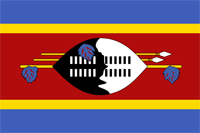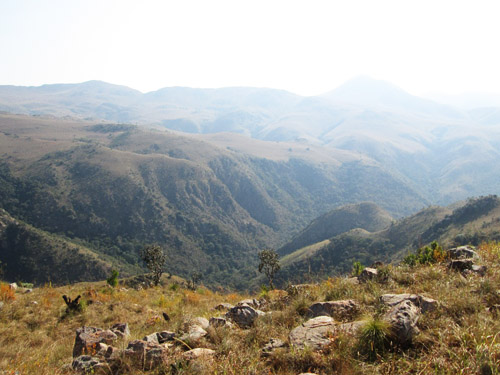 Swaziland’s national flag.“It’s difficult in Swaziland. Most of the working class gay men and other men who have sex with men (MSM) are in the closet, because in many cases if they find out you are gay, you may lose a job. I’m a teacher and the school wouldn’t tolerate it. I remember first learning about HIV in high school. I was taught that you have to be involved in vaginal sex in order to get it. I grew up with that. But then I discovered that it’s a vice-versa situation. I am actually in more danger and more exposed to HIV than straight people. We need to have a specific place where a gay person can be comfortable speaking candidly with a healthcare worker and can get this information.”
Swaziland’s national flag.“It’s difficult in Swaziland. Most of the working class gay men and other men who have sex with men (MSM) are in the closet, because in many cases if they find out you are gay, you may lose a job. I’m a teacher and the school wouldn’t tolerate it. I remember first learning about HIV in high school. I was taught that you have to be involved in vaginal sex in order to get it. I grew up with that. But then I discovered that it’s a vice-versa situation. I am actually in more danger and more exposed to HIV than straight people. We need to have a specific place where a gay person can be comfortable speaking candidly with a healthcare worker and can get this information.”
— Khulekani Dlamini (not his real name), co-director of Rock of Hope
Strategies:
1. Interview GMT to understand the barriers that prevent them from accessing healthcare
2. Train healthcare providers about GMT issues to help eliminate those barriers to care
3. Sensitize the media to GMT related issues
4. Train members of the GMT community to advocate for GMT friendly health services
In 2011, GMT Initiative director Kent Klindera visited the Kingdom of Swaziland and met some young Swazis who were fighting to get GMT included in countrywide plans for HIV reduction. Those advocates then founded the group Rock of Hope in order to help GMT and other most-at-risk populations (MARPs), such as female sex workers and drug users, get better healthcare. Due to their advocacy, the Ministry of Health has now included MARPs in the national HIV plan, and Rock of Hope members helped develop the language. “We made it clear that they needed to involve us in the planning, because there is nothing you can do about us, without us,” says Dlamini, borrowing a powerful advocacy slogan.
However, even with inclusion in the national plan, the barriers to improving their HIV care and knowledge remain high. Swaziland is a small landlocked country in southern Africa with beautiful mountains, flowing rivers, and the world’s highest HIV prevalence. An estimated 26.1 percent of reproductive age adults—and nearly half of people in their 30s— are HIV positive. GMT face severe discrimination in Swaziland, including in healthcare settings, and as a result many are reluctant to go to health clinics and hospitals or to candidly discuss their needs if they do go. “If somebody asked me, ‘When was the last time you had sex with a woman?’ I would just ignore the counselor or lie,” says Dlamini. “The counselor wouldn’t know who I am or what I need. The counselor would be getting a fake [me], while the real [me] would not be impacted.”

A Swazi landscape.
Rock of Hope is using its grant from amfAR to hold trainings for nurses and other healthcare workers in every region of Swaziland to help sensitize them to the specific needs of GMT. “If we sensitize health workers, it will be easy for our friends to go into the clinics, and by doing so HIV will be reduced in Swaziland,” says Dlamini. “And we are continuing to advocate for MSM rights so that eventually everyone can access health care without discrimination.”
In the past, there have been few studies among GMT in Swaziland, so Rock of Hope’s members worked with UNAIDS and Project SEARCH to produce a landmark report on MSM and female sex workers in Swaziland. With their unique connection to the local MSM community, they helped recruit 324 MSM from all four regions of Swaziland. Only half of all participants reported having been tested for HIV in the last 12 months, and among the participants who tested positive for HIV, 70 percent did not know it before the study. Additionally, 61.8 percent reported that they are afraid to seek healthcare because of their sexual orientation. One in five reported that they had received lower quality medical care—and 3 percent that they had been denied healthcare— because of their sexual orientation. The data found in this report are extremely valuable for Rock of Hope’s advocacy work and for their work training GMT peer educators and healthcare providers throughout the country.